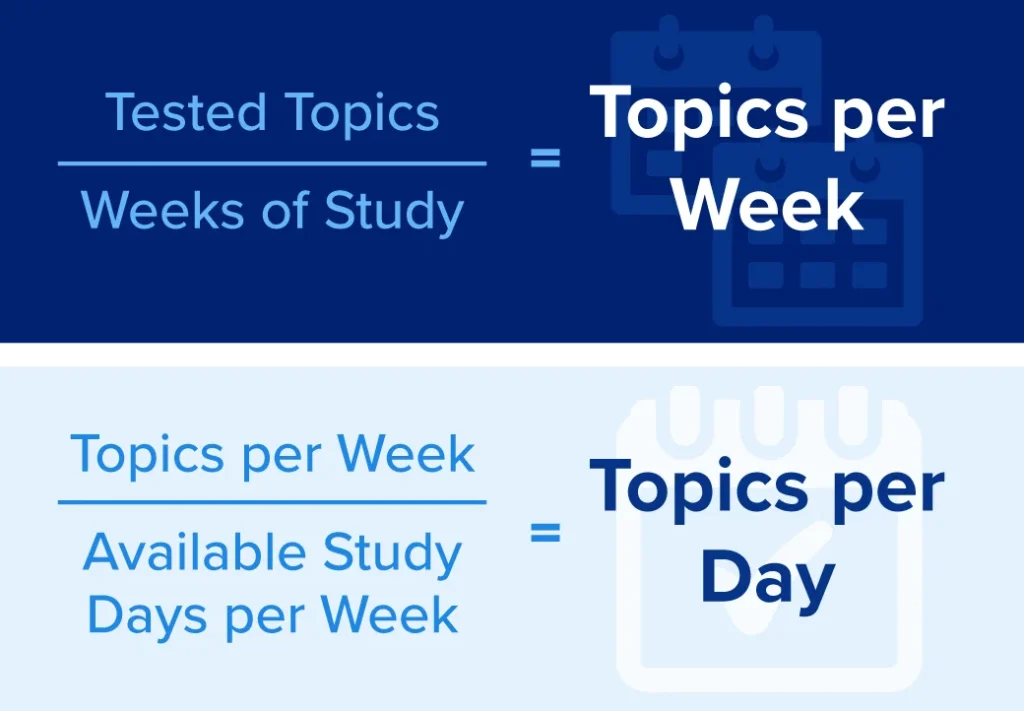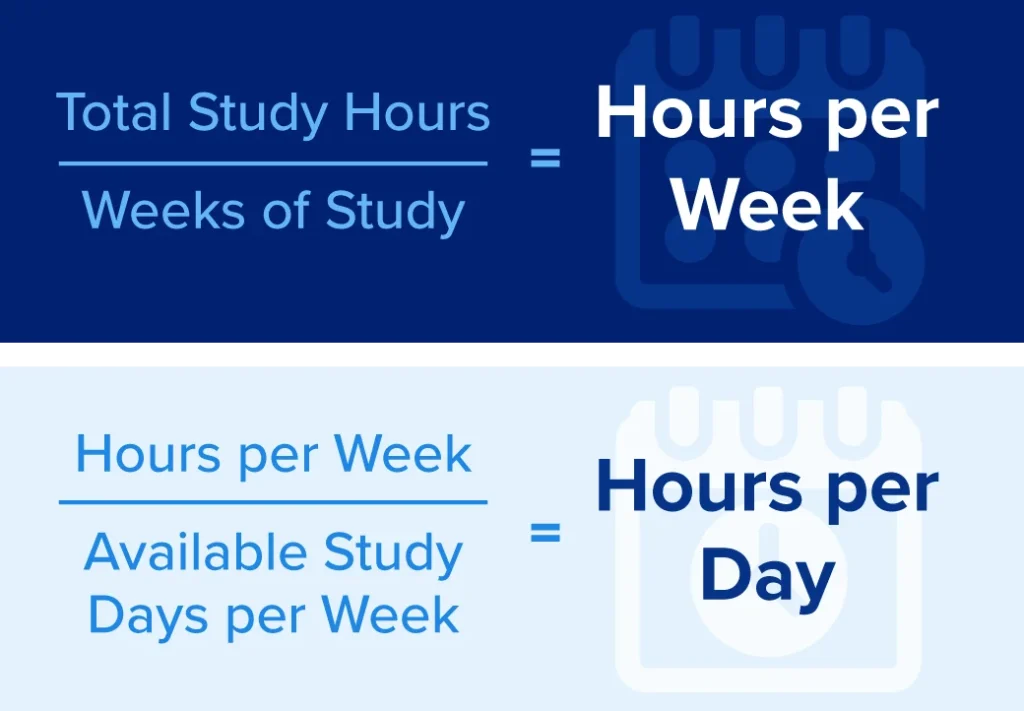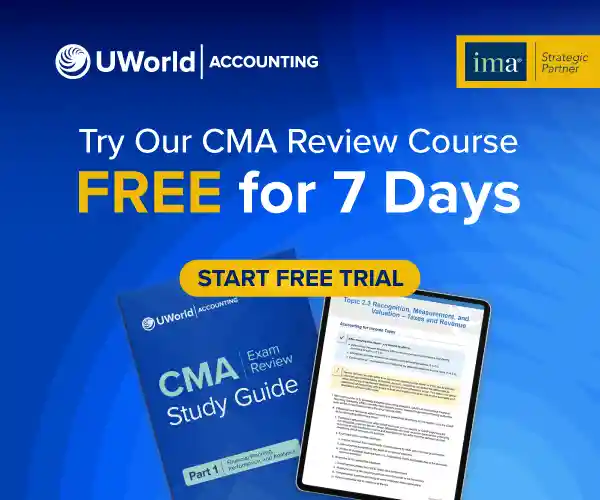You're here for a 6-month CMA study plan that works. These proven blueprints produce results and contain advice for each month — right through your final week.
Basic Formulas for CMA Study
Calculate how many CMA topics to cover each week or day with this equation:

Calculate how many hours to study daily or weekly with this equation:

6-Month CMA Study Plan by Topic Weight
Not all content on the CMA exam is equally weighted. If you're seeking a more in-depth study plan that accounts for content weightage, consider using these example study plans.
Study Plan 1: Sequential Study for Parts 1 and 2
Most experts suggest studying for and taking each of the 2 CMA exam parts separately. This approach allows you to focus on the specific content in each part without feeling overwhelmed. By passing 1 part first, you'll gain more motivation to tackle the next. Additionally, since exam topics are independent and exam windows are flexible, preparing sequentially is typically a more practical approach.
This plan allocates 12.5 hours per week of study for the first 3 months (Part 1) and the second 3 months (Part 2), for an average of about 160 hours of study for each exam part.
CMA Part 1 Study Plan
| Topic | Hours Per Week |
|---|---|
| External Financial Reporting Decisions (15%) | 1h 50m |
| Planning, Budgeting, and Forecasting (20%) | 2h 30m |
| Performance Management (20%) | 2h 30m |
| Cost Management (15%) | 1h 50m |
| Internal Controls (15%) | 1h 50m |
| Technology and Analytics (15%) | 1h 50m |
CMA Part 2 Study Plan
| Topic | Hours Per Week |
|---|---|
| Financial Statement Analysis (20%) | 2h 30m |
| Corporate Finance (20%) | 2h 30m |
| Business Decision Analysis (25%) | 3h 5m |
| Enterprise Risk Management (10%) | 1h 15m |
| Capital Investment Decisions (10%) | 1h 15m |
| Professional Ethics (15%) | 1h 50m |
Study Plan 2: Concurrent Study for Parts 1 and 2
While studying for CMA Parts 1 and 2 simultaneously isn't recommended as readily, it can be the stronger choice in specific situations. If you're working with a tight certification deadline, this approach will help you meet your goals faster.
This plan can also work well if you have a strong background in accounting or finance. In this case, overlapping knowledge can increase the speed at which you retain content. If you're motivated, disciplined, and can manage your time effectively, concurrent study might be the more practical approach.
This plan allocates 12.5 hours of study for both parts each week, for a total of approximately 325 study hours in 6 months.
| Topic | Exam Part | Hours per Week |
|---|---|---|
| External Financial Reporting Decisions (15%) | Part 1 | 55m |
| Planning, Budgeting, and Forecasting (20%) | Part 1 | 1h 15m |
| Performance Management (20%) | Part 1 | 1h 15m |
| Cost Management (15%) | Part 1 | 55m |
| Internal Controls (15%) | Part 1 | 55m |
| Technology and Analytics (15%) | Part 1 | 55m |
| Financial Statement Analysis (20%) | Part 2 | 1h 15m |
| Corporate Finance (20%) | Part 2 | 1h 15m |
| Business Decision Analysis (25%) | Part 2 | 1h 35m |
| Enterprise Risk Management (10%) | Part 2 | 35m |
| Capital Investment Decisions (10%) | Part 2 | 35m |
| Professional Ethics (15%) | Part 2 | 55m |
Easily Curate a Personalized 6-Month Study Plan
For the most effective, strategic, and personalized 6-month CMA study schedule, our study planner tool is the best way to optimize your valuable time. Simply enter your start date, target exam date, and weekly study hours, and you'll instantly receive a tailored plan with lesson deadlines aligned with the exam content.
If life changes along the way — whether your exam date moves or your schedule shifts — you can easily adjust your plan to stay on track without complications. This type of dynamic plan ensures you make steady progress without the added worry of having to manually restructure your schedule.
Try our CMA Study Planner, tailored to your needs.
6-Month CMA Study Plan: Month-by-Month Guide
A month-by-month roadmap ensures you know exactly what to focus on and when, helping you make consistent progress without feeling overwhelmed. With diligent preparation and targeted strategies, you'll be on track to ace the exam.
Months 1-2: Early Stages of Studying
Use the first 2 months of your CMA preparation to lay a strong foundation. Start by choosing a quality review program to guide your studies — self-studying without one can lead to gaps in understanding. Start by studying foundational topics that will give you an overview of other content tested. After building your foundational knowledge, diving into more specific topics will become easier.
Start by studying:
- Financial Statement Analysis
- Corporate Issuers
In the early months, split your time evenly between preparation and practice. Spend 50% of your study time reading and understanding key concepts and the other 50% solving questions to apply what you've learned. Familiarize yourself with the CMA exam structure and topic weightings for Parts 1 and 2, which are outlined in most review courses.
Months 3-4: Practice, Practice, Practice
In months 3 and 4, shift gears and intensify your efforts. Prioritize practicing all content areas, dedicating extra time to challenging topics.
Track your performance metrics during this phase to highlight your strengths, weaknesses, and areas needing further attention. To retain more content quickly, rely on high-quality CMA study materials such as:
Spend extra time working through practice problems that simulate the CMA exam. Increase the number of practice questions you complete each session, aiming for at least 20 per session. Include multiple-choice questions (MCQs) and essay questions in each session.
Timing your practice sessions to simulate exam conditions is wise in this stage, though full-length mock exams can wait until later. Consider joining study groups or forums to discuss challenging concepts. This will help you retain information and deepen your understanding as you intensify your study sessions.
Month 5: Take Mock Exams, Target Weaknesses
Use month 5 to identify and address weak areas in your preparation. Begin by taking several full-length mock exams and analyzing the results to pinpoint where you consistently underperform. Increase practice time to 70% of your study sessions, reducing the time spent on initial comprehension.
During this stage, emphasize the topics with the highest weight. This targeted approach ensures you're spending time where it will impact exam day most.
For Part 1, focus on studying:
- Planning, Budgeting, and Forecasting (20%)
- Performance Management (20%)
For Part 2, focus on studying:
- Business Decision Analysis (25%)
- Financial Statement Analysis (20%)
Continue to prepare for both MCQs and essay questions. If one type consistently poses a challenge, adjust your study plan to dedicate more time to improving those skills.
Month 6: Final Preparation Before Exam Day
Use your final month of preparation to fine-tune your knowledge, perfect your test-taking strategies, rest, and acknowledge that you are ready for the exam. Take at least 1 more full-length mock exam under strict time conditions, using only the calculator you'll bring on exam day. This practice helps you build familiarity and efficiency. After this, take a break from mock exams until exam day comes.
Spend the remainder of the month reviewing notes and summaries of key concepts. Additionally, fine-tune your memory aids and mnemonics for complex formulas and ideas. Practice time management strategies to ensure you can complete the exam within the allotted time.
In the final week before exam day, prioritize rest, mental preparation, and comprehensive review over studying all night. Getting enough sleep, reviewing key topics strategically, and practicing confidence-building techniques will bring you closer to your goals than cramming right before the exam.
How to Stay Motivated for 6-Months of Study
It's natural to feel a dip in motivation during your 6-month CMA study journey, especially while balancing work, life, and other commitments. However, don't let a loss of momentum discourage you. With the right strategies and mindset, you can stay motivated even when life gets hectic and energy feels low.
Set Realistic Goals to Avoid Discouragement
One key to staying motivated is setting realistic goals tailored to your abilities and study habits. Unrealistic goals, such as studying late into the night without rest, can leave you feeling defeated and burned out. Instead, focus on creating a sustainable study plan that allows for balance and consistency.
Monitor your daily progress and adjust your plan to stay on track without overloading yourself. Adaptive learning tools can help you identify and address your knowledge gaps more efficiently, ensuring that your study sessions are effective. Meeting realistic goals will keep you refreshed and motivated to push forward instead of feeling discouraged.
Set Milestones and Celebrate Small Wins
Set clear milestones for completing each study plan section, and reward yourself when you achieve them. These rewards don't have to be extravagant — something as simple as a favorite treat, an episode of your go-to show, or a relaxing walk can motivate you to keep moving forward.
Whether mastering a tricky concept or completing a practice test, don't become so burrowed into your work that you forget to take a moment to reward yourself for how far you've come. Recognizing your progress will create positive momentum, making tackling the next complex subject easier.
Connect With Other CMA Candidates
Studying for the CMA exam doesn't have to be a solo endeavor. Joining study groups or online forums will help you share experiences, exchange study tips, and stay motivated. Connecting with peers who understand the challenges you're facing can be comforting and encouraging.
If you're a member of Institute of Management Accountants (IMA), take advantage of its network. Participate in local IMA chapter events to meet fellow candidates and experienced CMAs, or engage with the global CMA community through online platforms. Building a supportive community improves your CMA study experience. It also provides a network that understands what you're going through and can support you as you come closer to becoming a CMA-certified professional.








